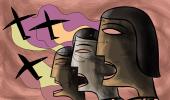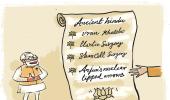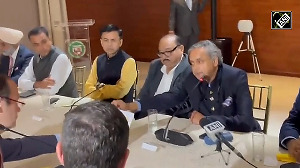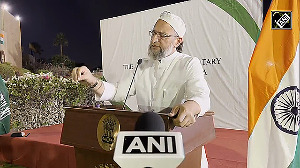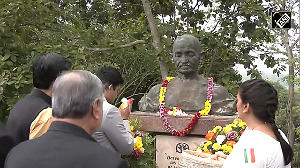'...but subjecting our heritage to rigorous evidence-based understanding.'
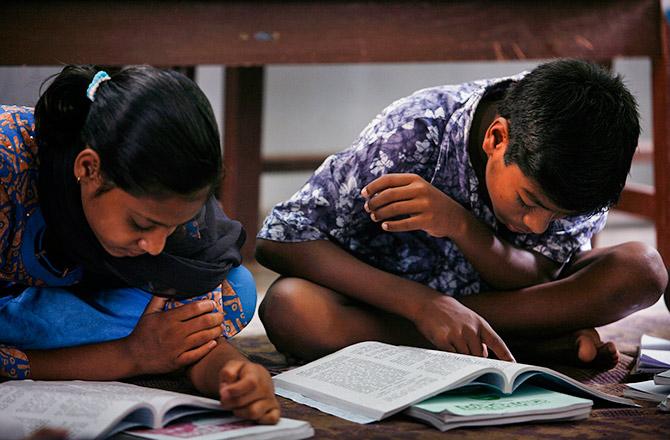
Members of the All India People's Science Network (AIPSN), consisting of 40-odd organisations across the country working on science and society-related issues, in an online public petition have urged higher education institutions (HEIs) to oppose the teaching of 'pseudoscientific topics like astrology and reincarnation'.
In a statement to the media, AIPSN said, 'We urge all HEIs to use only well-researched scientific sources for their Indian knowledge system (IKS) courses and weed out pseudoscientific claims. They should stay true to the diversity that is inherent in the IKS.'
'We also call out all academics who are doing disservice to education in general but knowledge systems in particular by inclusion of the pseudoscientific claims in their courses,' the AIPSN statement added.
"Isaac Newton was a great physicist, but today's physicists know much more that what Newton did. Do we take everything what Isaac Newton said as scripture? The answer is no. We respect Isaac Newton as a good physicist and we do respect in the same way Susruta and Charak Samhita," AIPSN President Satyajit Rath tells Syed Firdaus Ashraf/Rediff.com.
IIT Mandi has launched a course 'Indian Knowledge System and Mental Health Applications', which talks of reincarnation and near-death and out of body experiences. Does this come as a surprise?
The issue of decolonisation of education, which everybody agrees with, is the approach being used to push irrational and non-evidence based claims to knowledge. I will not even call this as knowledge. IIT Mandi is an example of what you are talking about.
In fact, the head of IIT Mandi was in the news last year for linking meat eating to landslides.
I will give you another example of thw IIT Kharagpur calendar which is full of errors. All the claims in the calendar are either evidence-free or based on misreading of evidence or filling in gaps where evidence does not exist by wishful thinking. It was all irrational and inappropriate.
(Note: After a controversy erupted, IIT Kharagpur denied it had published the calendar.)
All of this is done to support the idea of past history of the subcontinent which was far more homogeneous, Sanskrit, Brahmanical and far less diverse, which it really had been.
The decolonisation must be done by looking into scholarships without being affected by colonial prejudices.
It is equally important not to be coloured by Hindutva prejudice.
It is fundamentally important to take evidence (for research).
Scientists and former IIT alumni are speaking up against the NCERT textbooks and the National Democratic Alliance government's education policy. Has there been any change in the government's attitude?
I don't know as this is a bit counterfactual, as we don't know what would have been the case if there was no pressure.
But if you look at the textbooks which have come out, like that of 6th standard NCERT textbook (external link), which is on their Web site, you will find that it is not chauvinistic as the social science text books are.
This is a welcome step, but then, whether it is due to our pressure or if our pressure was not there what would have been printed in the textbook, it is impossible to say.
Do you fear that the government is poorly conceiving the new courses which can lead to problems for future generations?
Textbooks are not about courses alone but how the resource material are organised and presented to students. Omissions matter as much as what is included in the textbooks.
Obviously in history and social sciences many of our colleagues other than scientists have pointed out the problem.
In science terms, we do not think the courses are poorly conceived but centralising all educational resources is itself a problem.
Different parts of the country have different needs and different situations. The best possible resource development can be done locally and not much through one source.
The government, however, will point out that there are state level SCERTs (State Council for Education Research and Training).
While this is true, the overall thrust of the New Education Policy is about centralisation, both in terms of resources, evaluation and curriculum. This is like one book fits all, one pattern is fine, one size fits all approach is an error for a diverse and large country like India.
The Union government defends itself by stating that mythology and philosophy put forward ideas that lead to innovation and research. How do you counter that?
There is nothing to counter this because it is completely ridiculous. When you talk about evidence or fact-free set of claims it is the situation of emperor's new clothes.
Everybody knows there are no new clothes the emperor is wearing but the difference is that there are those who will willfully insist the emperor has new clothes. And for the rest of us like me and you, we can see the emperor has no new clothes.
In one of your lectures you stated that before Yuri Gagarin travelled to space there has been no proof of any human leaving Earth to travel to space but ironically, all cultures and religions around the world have literary references of their gods flying about in the sky.
So what will you tell children, even if their textbooks are saying the fact about Yuri Gagarin, because religion is ingrained in us?
In all cultural communities across the world humanity has wished for impossible things. Mungerilal ke haseen sapney sirf Hindustan mein nahin dekhe jaatey (Daydreaming is not done only in India). It has happened across different cultures of the world.
The belief system of children gets imbibed from their home, isn't it?
For belief system, the All India People's Science Network does not insist on atheism or agnosticism. Our position is that all of us have our own beliefs. We need to make a distinction when our belief system is useful to us to give us solace and comfort. That is why we turn to belief system.
In what way has ancient India contributed to our modern sciences?
Ancient India made major contribution in maths, philosophy, anatomy, physiology, crop diversification and technology development. It has made contributions to the abilities of humankind to live better in very material terms.
Why then don't you believe in planes flying in ancient India as some claim?
I believe in evidence.
I will give you the example of Ayurveda. People ask me what is my problem with Ayurveda. I say I do not have any problem with Ayurveda. It was the medical science of its time. We should be incorporating whatever we can from that provided evidence holds it up in learning and the practice of our medicines.
But to treat Ayurvedic texts as scriptures and say that they cannot be changed as they are imbued with special wisdom of the time is simply irrational that flies in the face of evidence.
Isaac Newton was a great physicist, but today's physicists know much more that what Newton did. Do we take everything what Isaac Newton said as scripture? The answer is no. We respect Isaac Newton as a good physicist and we do respect in the same way Susruta and Charak Samhita. They were great people in their time.
This is not about rejecting our heritage but subjecting our heritage to rigorous evidence-based understanding, so that's what will happen if we use their treatment on today's patient.
Why have we come to a situation where we feel proud of hamarey poorvaj kuch thay rather than coming to facts on scientific temper and spirit of inquiry which the Constitution mentions under Article 51A(h)?
This is because we consider ourselves powerless and tell ourselves, 'hamari koi haisiyat hi nahi hai (we do not have any standing).' Our respect as human beings today cannot be on the basis of 'hamarey ancestors kuch thay (our ancestors were great). Yeh kya baat hui?'
We are worthy of respect for each other and civility simply because we are human beings and not because some of us are descended from someone.
What do you do to inculcate scientific temper in students if the government is against it?
You support countervailing efforts and it is possible.
In Madhya Pradesh the NGO Eklavya has been struggling and we are trying to inculcate curiosity which fosters learning and evidence-based understanding.
Another example is the All India People's Science Network brought out a calendar to counter IIT Kharagpur's calendar.
These are the ways we push back and only such kind of understanding which is rational and based on evidence will help us in future.
How are the students responding?
There is a great deal of response, but the attitude of the government is a worry among institutions and leadership in those organisations.
The leaders in those organisations feel if they give importance to us, what will the government say? What action will be taken against them?
Often the government does not do anything, but there is fear and worry. This leads to a problem in our outreach.
